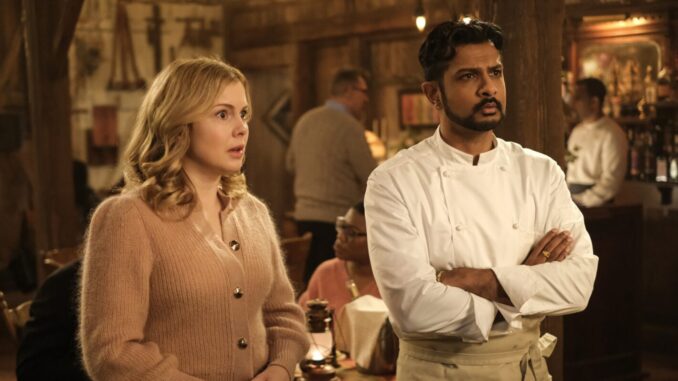
The alchemy of television lies not just in the scripted words or the perfectly framed shot, but often in the fleeting, unscripted moments that peel back the curtain, offering a glimpse into the creative heart of a production. For fans of the beloved CBS sitcom Ghosts, few such glimpses hold as much narrative weight and eager speculation as a casual, behind-the-scenes hint. When Utkarsh Ambudkar, the charismatic actor behind Jay Arondekar, exchanged a seemingly innocuous moment with Rose McIver (Sam), hinting at Jay’s "comeback," it wasn't just a spoiler; it was a ripple in the fabric of a carefully constructed comedic universe, a promise of a potential paradigm shift that illuminates the very essence of the show's charm and its intricate narrative dance.
Ghosts thrives on a magnificent incongruity: Sam, a living human, can see and communicate with the spectral residents of her inherited country estate, while her loving husband, Jay, remains blissfully, hilariously oblivious. This dynamic is the show’s comedic linchpin and emotional anchor. Jay’s inability to see the ghosts makes him the ultimate audience surrogate, the grounded skeptic whose reactions to Sam’s often baffling conversations with thin air provide a constant source of humor and relatability. He’s the tangible, beating heart in a house full of ethereal beings, his love for Sam transcending the bizarre circumstances they find themselves in. Yet, for all his endearing qualities, there’s always been a collective whisper among the fanbase, and indeed, within the spectral ensemble itself: What if Jay could see us?
Enter the behind-the-scenes moment. It’s rarely a grand pronouncement, but rather a subtle gesture – a knowing glance, a shared smirk, a hushed murmur between takes that escapes the confines of the set and makes its way onto social media. Imagine the scene: the lights are hot, the crew bustles around, yet for a split second, the characters drop away, and the actors, Ambudkar and McIver, share a private moment. Perhaps Ambudkar taps his temple with a mischievous grin, or whispers a half-joking line about "finally getting to join the party" in Sam's ghostly world. McIver might respond with a wide-eyed mock surprise, a gesture towards the unseen spirits. It’s this intimate, almost conspiratorial exchange, brimming with the easy camaraderie of two leads, that ignites the speculation. It’s not a script leak; it’s an actor’s playful acknowledgement of a deeply desired fan fantasy, delivered with the subtle flourish of a magician hinting at a trick.
The power of such a hint lies in its capacity to transform the show's core dynamic. A "comeback" for Jay, in the context of Ghosts, can only mean one thing: regaining his ability to see the spirits, an ability he briefly possessed after his near-death experience in the pilot. This possibility isn't merely a plot twist; it’s a narrative earthquake. For three seasons, Sam has been the bridge, the interpreter, the sole conduit between the living world and the spectral. Her unique burden has forged a deep, often hilarious, bond with the ghosts, and has tested the limits of her marriage. If Jay can see them, the humor shifts. The misunderstandings disappear, replaced by a shared reality. Their marriage, already a bedrock of love and support, would deepen into a shared secret, a mutual journey into the supernatural.
But such a "comeback" is a double-edged sword, a narrative tightrope walk. While the prospect of Jay joining the ghostly ensemble’s antics promises new comedic avenues—imagine his reactions to Trevor’s antics or Isaac’s historical grievances firsthand!—it also risks dismantling the very tension that makes the show so compelling. The humor often springs from Jay’s well-meaning but ultimately futile attempts to understand Sam’s ghost-laden life. His blindness forces creative solutions and provides a grounded counterpoint to the fantastical. A full "comeback" would require a delicate rebalancing act, retaining the charm of the original premise while embracing the exciting, yet potentially disruptive, new possibilities.
Ultimately, Ambudkar’s hint, glimpsed in a fleeting behind-the-scenes moment, is more than just a tease for future plotlines. It is an illustrative testament to the vibrant, interactive relationship between creators and audience in modern storytelling. It’s a nod to the fans’ investment, acknowledging their collective hope and anticipation. It reveals the actors’ deep understanding of their characters and the show's intricate dynamics. It reminds us that even in the tightly controlled world of network television, there’s a living, breathing pulse of creativity and collaboration, where a simple, shared glance can spark a thousand theories and underscore the enduring magic of a story still unfolding. Whether Jay fully re-enters the realm of the unseen, or merely dips his toe in the spectral waters, the anticipation itself is a powerful force, driven by the whispered promises of a playful behind-the-scenes moment.